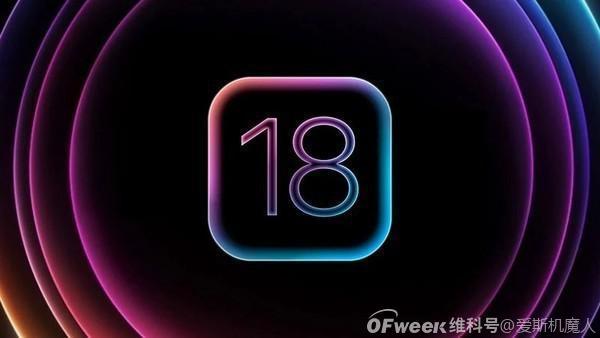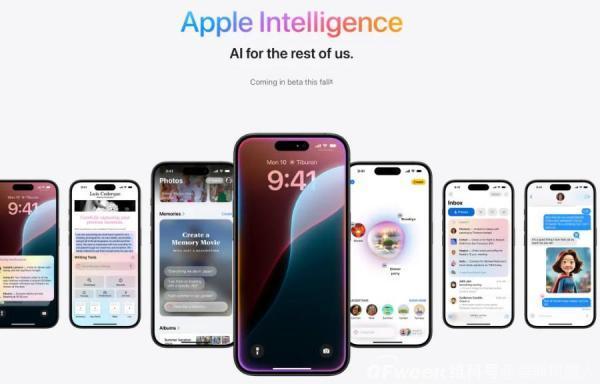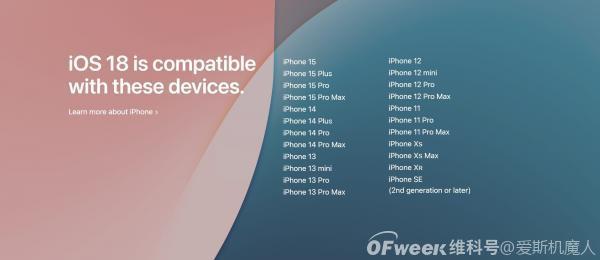iOS 18 Officially Launched: Apple Once Again Sparked Mockery!
![]() 06/12 2024
06/12 2024
![]() 610
610
Written by Mingmei Wuxian
iOS 18 officially made its debut at the keynote speech of Apple's Worldwide Developers Conference (WWDC) in 2024. Everyone has been eagerly anticipating iOS 18, and this year's news and leaks about the new version update have been particularly intense, surpassing even last year's speculation surrounding iOS 17.
So, are all these expectations and heated discussions justified? Next, let's take a look at the new features iOS 18 brings.

First, as the latest generation of the operating system, iOS 18 supports custom lock screens, allowing users to adjust wallpapers, font styles, and even the display of time and date according to their preferences, making each iPhone a unique existence.
Moreover, iOS 18 introduces a single app lock feature, allowing users to add an additional password layer of protection for sensitive apps to ensure personal information security.
Notably, iOS 18 adds a new gaming mode, where system resources are optimized to ensure smooth and responsive game performance. Simultaneously, iOS has enhanced wireless connections for game controllers and AirPods, reducing latency and enhancing players' immersion in the game.
In addition, Apple has introduced an innovative feature in the newly released iOS 18 operating system for users who frequently use their phones while riding in vehicles—a motion sickness prevention feature. This feature aims to improve the riding experience by reducing users' feelings of motion sickness in moving vehicles.
Apple first announced this feature in a press release on May 15, and now users can experience this new feature by updating to the latest iOS 18 system. The specific operation method is to go to "Settings - Accessibility - Motion" and find and turn on the "Show Motion Indicators" option.
This new feature utilizes the iPhone's built-in sensors to identify the acceleration direction of the vehicle and display small dots on the screen that match the vehicle's inertia. This helps reduce the conflict between visual and actual sensations, thus alleviating motion sickness.
According to research, motion sickness often stems from this conflict between visual and actual sensations. Apple's new feature aims to address this issue. Animated dots are displayed at the edges of the screen, representing changes in vehicle movement, helping reduce the possibility of motion sickness while ensuring that the main display content is not disturbed.
Furthermore, Apple has officially introduced eye tracking functionality in the newly released iOS 18 operating system.
This technology utilizes the built-in front camera to capture users' eye movements and is calibrated through on-device machine learning, enabling users with disabilities to control their iPhones and iPads using only their eyes.
The eye tracking feature is designed to provide a more convenient operating experience for users with disabilities. Users can set up and calibrate it in just a few seconds, then browse app elements, activate various elements using dwell control, and even access physical buttons, swipes, and other gestures through their eyes.
It's worth noting that all setup and control data are securely stored on the device and are not shared with Apple, fully protecting user privacy.
Moreover, the eye tracking feature in iOS 18 does not require any additional hardware or accessories and runs smoothly in iPadOS and iOS apps.
In addition to eye tracking, Apple has also introduced accessibility features such as haptic music and voice shortcuts, further enhancing support for users with disabilities.
The haptic music feature provides deaf or hard-of-hearing users with a new way to experience music through the iPhone's haptic engine, while voice shortcuts allow users to perform tasks using customized voice commands.
Then, in the first developer preview of iOS/iPadOS 18, Apple's "Apple ID" has been replaced by the new name "Apple Account."
Apple has also updated its developer software license agreement, updating some "Apple ID" terms to "Apple Account."
Mingmei Wuxian previously reported that Gurman had revealed that there was an "Apple Account" team within Apple, and the new name would be enabled later this year on the web and in significant software updates即将发布by Apple. It is expected that the term "Apple ID," which has been in use for over 20 years, will be phased out later this year.
Next, Apple announced at the WWDC24 developers' conference on June 10, local time, that it would extend satellite communication functionality to iMessage and SMS apps on iOS 18. Previously, satellite communication was only used for SOS emergency contacts. Apple has not provided more details, including whether the iMessage satellite feature will be free.
Furthermore, foreign media dug into the iOS 18 update and found that the flashlight app can now adjust the intensity and radius of the light in addition to controlling brightness.
Apple's iOS system comes with a native flashlight function, which is quite basic, and many users' requirements are "as long as it works." Therefore, it is mainly used as a simple tool for illumination.
The two buttons below the custom lock screen can no longer be the flashlight and camera.
Apple has further optimized the flashlight function in iOS 18, allowing users to change the flashlight button on the lock screen, helping users avoid accidentally turning on the flashlight.
New sliders can adjust the intensity and radius of the flashlight.
Apple's iOS 18 system also adds two new sliders, allowing users to control the intensity and radius of the flashlight, a feature that is currently not available on any Android phones.

It's worth mentioning that the official version of iOS often encounters many bugs, not to mention the beta version. If you only have one primary device, upgrading prematurely would be self-inflicted suffering. And renowned technology journalist Mark Gurman also reminded users on X to be cautious about upgrading.
Remember when iOS 17 was just released, it also encountered a large number of bugs. These included but were not limited to app crashes during installation, excessive battery consumption, disconnections in mobile signals or WiFi, incompatibility with many apps, and screen lag. The stability of system software is crucial, as frequent issues not only affect the user experience but can also delay important matters.
The iOS operating system has always been known for its stability and security, but iOS in recent years has felt subpar. In addition to numerous bugs, its innovativeness has been far surpassed by domestic Android systems. Although Apple's sales are still leading, if this continues, being overtaken is inevitable.
Many of the new features in iOS 18, in the eyes of many netizens, are already used by Android phones for countless years. Many netizens have complained, saying, "Apple is crossing the river by feeling the stones of Android phones" and "iOS 18 is the same as a kid's smartwatch."
As one of the core competitiveness of Apple phones, the iOS system has always been known for its unique design and smooth user experience. However, with the continuous advancement of technology and intensifying market competition, iOS 18 seems to be somewhat "outdated" in some aspects. Many netizens have found that many of the new features in iOS 18, such as customizing the home screen, upgrading privacy protection, and significant changes to the control center, have long been standard on Android phones and have become quite mature after years of iterative optimization.
In this iOS 18 update, Apple has also introduced separate apps for passwords, maps, wallets, diaries, notes, and calendars, aiming to provide users with more convenient services. However, these functions already have similar alternatives on Android phones, with richer and more powerful functionalities. This has led many netizens to question whether Apple is "crossing the river by feeling the stones of Android phones" and lacks innovation.
Even more comical is that iOS 18 has added some features that seem to be "the same as a kid's smartwatch." For example, the App Lock feature allows users to lend their phones to children or friends while only opening specific apps and hiding those they don't want to be viewed. This feature has long been implemented on many children's smartwatches, and Apple's introduction of it into the iOS system inevitably feels a bit "awkward."
In the comments section, netizens have expressed concerns about the initial version of iOS 18. Some users have reported icon lag issues and worry that the primary device may experience lag after upgrading. Others are curious about the flashlight's animation and inquire about its actual performance. Meanwhile, some users have noticed that the signal display in the images posted by the blogger only has one bar, joking, "That's a strong signal, the next step is to lose connection." Regarding the release time of the official version, users have expressed anticipation and suggested waiting for the stable version before upgrading.
Of course, if you are curious about the new features of iOS 18 and want to experience them early, you can consider upgrading on a spare device first. This way, you can satisfy your curiosity without significantly affecting the usage of your primary device.
In addition, let's talk about which devices can be upgraded.
iOS 18: All devices that support iOS 17 can be upgraded to iOS 18, but only the iPhone 15 Pro and iPhone 15 Pro Max support Apple Intelligence features. iPadOS 18: iPad 7 and newer models, iPad mini 5 and newer models, iPad Air 3 and newer models, iPad Pro 2018 and newer models.
Currently, the developer preview of iOS 18 has been released, and the public beta is expected to arrive next month. If you plan to wait for the official release, you will have to wait until the end of this autumn. Additionally, all the new features of Apple Intelligence will also gradually open for testing in the fall, allowing users to experience them firsthand.
Overall, while Apple Intelligence provides many AI functions, there is indeed a tendency towards Androidization. However, it's important to remember that Apple's Apple Intelligence runs throughout the entire ecosystem. Although the number of supported devices is currently quite limited, this advantage will gradually expand over time, and the interconnected experience between products will become even more extreme. Therefore, domestic manufacturers currently leading in AI will face new challenges, and whether they can continue to lead and promote the widespread adoption of AI is also something worth looking forward to.

Lastly, Mingmei Wuxian would like to say: The new features of iOS 18 cannot be described as highly "revolutionary"; many of them have already been implemented by competitors. Nowadays, iOS is becoming more refined in its minor functions, offering a higher degree of customization, making phones more personalized and user-friendly. It seems that Apple, which once taught users how to use their phones, has lowered its stance.
Every year, WWDC is always criticized for being "not impressive enough," but these accumulated minor features are the cornerstone of continuously improving the user experience.
Moreover, this year, Apple Intelligence has been responsible for the surprises, hasn't it?
According to feedback from users who have already upgraded, the iPhone may experience temporary heating after upgrading to the preview version, but there are relatively few bugs in the system overall. Daily apps like WeChat have not encountered significant adaptation issues, but occasionally, there have been issues like app crashes and freezes during the experience.
Therefore, regarding iOS 18, some netizens have expressed: "It's just copying Android features, becoming more and more similar, with increasingly limited choices." "Why does iOS 18/iPad OS always update with what Android has left over? It doesn't incorporate any of the good aspects of Android." "iOS 18 in summary: becoming Android."
Of course, under the cover of AI's glory, iOS 18 has temporarily avoided the fire of criticism. However, as AI matures in mobile device applications, users' attention will eventually return to the system itself. We will wait and see if iOS can continue to support users' expectations for the iPhone.
Regarding this, while some features of iOS 18 are "paying tribute" to Android, there is no doubt that they will further enhance the user experience for iPhone users. Will you upgrade?







